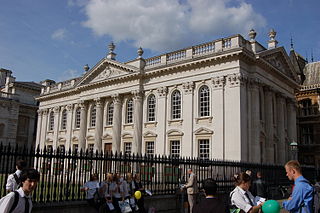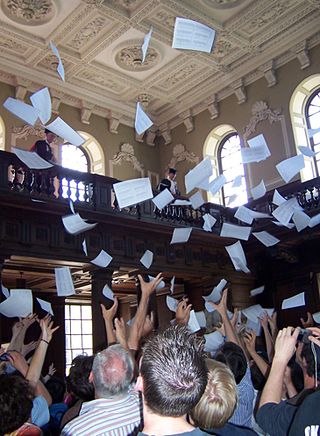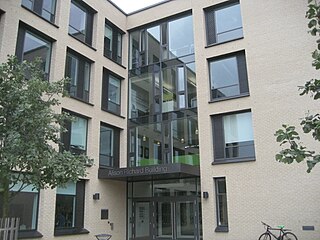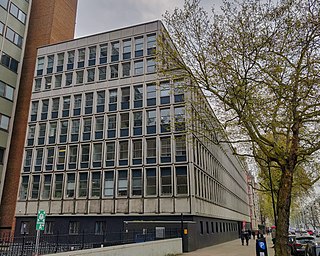
A Tripos is an academic examination that originated at the University of Cambridge in Cambridge, England. They include any of several examinations required to qualify an undergraduate student for a bachelor's degree or the courses taken by a student to prepare for these. Undergraduate students studying mathematics, for instance, ultimately take the Mathematical Tripos, and students of English literature take the English Tripos.

A Bachelor of Arts is the holder of a bachelor's degree awarded for an undergraduate program in the liberal arts, or, in some cases, other disciplines. A Bachelor of Arts degree course is generally completed in three or four years, depending on the country and institution.

The British undergraduate degree classification system is a grading structure used for undergraduate degrees or bachelor's degrees and integrated master's degrees in the United Kingdom. The system has been applied, sometimes with significant variation, in other countries and regions.

The Department of Computer Science at the University of Manchester is the longest established department of Computer Science in the United Kingdom and one of the largest. It is located in the Kilburn Building on the Oxford Road and currently has over 800 students taking a wide range of undergraduate and postgraduate courses and 60 full-time academic staff.

The Department of Computer Science and Technology, formerly the Computer Laboratory, is the computer science department of the University of Cambridge. As of 2023 it employed 56 faculty members, 45 support staff, 105 research staff, and about 205 research students. The current Head of Department is Professor Alastair Beresford.

Part III of the Mathematical Tripos is a one-year master's-level taught course in mathematics offered at the Faculty of Mathematics, University of Cambridge. It is regarded as one of the most difficult and intensive mathematics courses in the world. Roughly one third of the students take the course as a continuation at Cambridge after finishing the Parts IA, IB, and II of the Mathematical Tripos resulting in an integrated Master's (M.Math), whilst the remaining two thirds are external students who take the course as a one-year Master's (M.A.St).
Diploma in Computer Science, originally known as the Diploma in Numerical Analysis and Automatic Computing, was a conversion course in computer science offered by the University of Cambridge. It is equivalent to a master's degree in present-day nomenclature but the title diploma was retained for historic reasons, "diploma" being the archaic term for a master's degree.
The Natural Sciences Tripos (NST) is the framework within which most of the science at the University of Cambridge is taught. The tripos includes a wide range of Natural Sciences from physics, astronomy, and geoscience, to chemistry and biology, which are taught alongside the history and philosophy of science. The tripos covers several courses which form the University of Cambridge system of Tripos. It is known for its broad range of study in the first year, in which students cannot study just one discipline, but instead must choose three courses in different areas of the natural sciences and one in mathematics. As is traditional at Cambridge, the degree awarded after Part II is a Bachelor of Arts (BA). A Master of Natural Sciences degree (MSci) is available to those who take the optional Part III. It was started in the 19th century.

The Faculty of Law, Cambridge is the law school of the University of Cambridge.

The Mathematical Tripos is the mathematics course that is taught in the Faculty of Mathematics at the University of Cambridge.

The Department of Computer Science is the computer science department of the University of Oxford, England, which is part of the university's Mathematical, Physical and Life Sciences Division. It was founded in 1957 as the Computing Laboratory. By 2014 the staff count was 52 members of academic staff and over 80 research staff. The 2019, 2020 and 2021 Times World University Subject Rankings places Oxford University 1st in the world for Computer Science. Oxford University is also the top university for computer science in the UK and Europe according to Business Insider. The 2020 QS University Subject Rankings places The University of Oxford 5th in the world for Computer Science.

Lawrence Charles Paulson is an American computer scientist. He is a Professor of Computational Logic at the University of Cambridge Computer Laboratory and a Fellow of Clare College, Cambridge.

Sir Demis Hassabis is a British artificial intelligence (AI) researcher, and entrepreneur. He is the chief executive officer and co-founder of Google DeepMind, and Isomorphic Labs, and a UK Government AI Adviser. In 2024, Hassabis and John M. Jumper were jointly awarded the Nobel Prize in Chemistry for their AI research contributions for protein structure prediction.

The University of Cambridge was the birthplace of the 'Analytic' School of Philosophy in the early 20th century. The department is located in the Raised Faculty Building on the Sidgwick Site and is part of the Cambridge School of Arts and Humanities. The Faculty achieved the best possible results from The Times 2004 and the QAA Subject Review 2001 (24/24). In the UK as of 2020, it is ranked second by the Guardian, second by the Philosophical Gourmet Report, and fifth by the QS World University Rankings.

The University of Cambridge's Department of Engineering is the largest department at the university. The main site is situated at Trumpington Street, to the south of the city centre of Cambridge. The department is currently headed by Professor Colm Durkan.

The Faculty of Human, Social, and Political Science at the University of Cambridge was created in 2011 out of a merger of the Faculty of Archaeology and Anthropology and the Faculty of Politics, Psychology, Sociology and International Studies. According to the Cambridge HSPS website: graduates pursue careers in "research, the Civil Service, journalism, management consultancy, museums, conservation and heritage management, national and international NGOs and development agencies, the Law, teaching, publishing, health management, and public relations."

The University of Cambridge Institute of Continuing Education (ICE) is a department of the University of Cambridge that provides continuing education programmes at undergraduate and postgraduate levels, ranging from undergraduate certificates to master’s degrees.

The Department of Politics and International Studies at the University of Cambridge is the department at the University of Cambridge responsible for research and instruction in political science, international relations and public policy. It is part of the Faculty of Human, Social, and Political Science.

The Department of Computing (DoC) is the computer science department at Imperial College London. The department has around 50 academic staff and 1000 students, with around 600 studying undergraduate courses, 200 PhD students, and 200 MSc students. The department is predominantly based in the Huxley Building, 180 Queen's Gate, which it shares with the Maths department, however also has space in the William Penney Laboratory and in the Aeronautics and Chemical Engineering Extension. The department ranks 7th in the Times Higher Education 2020 subject world rankings.
Neil David Lawrence is the DeepMind Professor of Machine Learning at the University of Cambridge in the Department of Computer Science and Technology, senior AI fellow at the Alan Turing Institute and visiting professor at the University of Sheffield.















